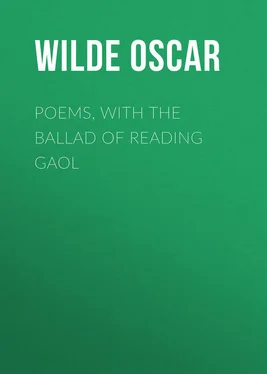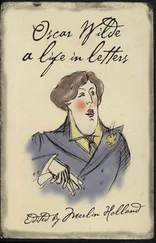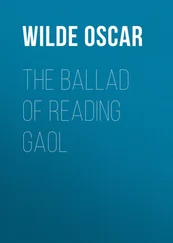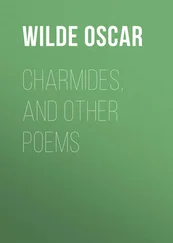Oscar Wilde - Poems, with The Ballad of Reading Gaol
Здесь есть возможность читать онлайн «Oscar Wilde - Poems, with The Ballad of Reading Gaol» — ознакомительный отрывок электронной книги совершенно бесплатно, а после прочтения отрывка купить полную версию. В некоторых случаях можно слушать аудио, скачать через торрент в формате fb2 и присутствует краткое содержание. Жанр: literature_19, Поэзия, foreign_prose, foreign_poetry, на английском языке. Описание произведения, (предисловие) а так же отзывы посетителей доступны на портале библиотеки ЛибКат.
- Название:Poems, with The Ballad of Reading Gaol
- Автор:
- Жанр:
- Год:неизвестен
- ISBN:нет данных
- Рейтинг книги:5 / 5. Голосов: 1
-
Избранное:Добавить в избранное
- Отзывы:
-
Ваша оценка:
- 100
- 1
- 2
- 3
- 4
- 5
Poems, with The Ballad of Reading Gaol: краткое содержание, описание и аннотация
Предлагаем к чтению аннотацию, описание, краткое содержание или предисловие (зависит от того, что написал сам автор книги «Poems, with The Ballad of Reading Gaol»). Если вы не нашли необходимую информацию о книге — напишите в комментариях, мы постараемся отыскать её.
Poems, with The Ballad of Reading Gaol — читать онлайн ознакомительный отрывок
Ниже представлен текст книги, разбитый по страницам. Система сохранения места последней прочитанной страницы, позволяет с удобством читать онлайн бесплатно книгу «Poems, with The Ballad of Reading Gaol», без необходимости каждый раз заново искать на чём Вы остановились. Поставьте закладку, и сможете в любой момент перейти на страницу, на которой закончили чтение.
Интервал:
Закладка:
Ah! leave it for a subtle memory
Of those sweet tremulous days of rain and sun,
When April laughed between her tears to see
The early primrose with shy footsteps run
From the gnarled oak-tree roots till all the wold,
Spite of its brown and trampled leaves, grew bright with shimmering gold.
Nay, pluck it too, it is not half so sweet
As thou thyself, my soul’s idolatry!
And when thou art a-wearied at thy feet
Shall oxlips weave their brightest tapestry,
For thee the woodbine shall forget its pride
And veil its tangled whorls, and thou shalt walk on daisies pied.
And I will cut a reed by yonder spring
And make the wood-gods jealous, and old Pan
Wonder what young intruder dares to sing
In these still haunts, where never foot of man
Should tread at evening, lest he chance to spy
The marble limbs of Artemis and all her company.
And I will tell thee why the jacinth wears
Such dread embroidery of dolorous moan,
And why the hapless nightingale forbears
To sing her song at noon, but weeps alone
When the fleet swallow sleeps, and rich men feast,
And why the laurel trembles when she sees the lightening east.
And I will sing how sad Proserpina
Unto a grave and gloomy Lord was wed,
And lure the silver-breasted Helena
Back from the lotus meadows of the dead,
So shalt thou see that awful loveliness
For which two mighty Hosts met fearfully in war’s abyss!
And then I’ll pipe to thee that Grecian tale
How Cynthia loves the lad Endymion,
And hidden in a grey and misty veil
Hies to the cliffs of Latmos once the Sun
Leaps from his ocean bed in fruitless chase
Of those pale flying feet which fade away in his embrace.
And if my flute can breathe sweet melody,
We may behold Her face who long ago
Dwelt among men by the Ægean sea,
And whose sad house with pillaged portico
And friezeless wall and columns toppled down
Looms o’er the ruins of that fair and violet cinctured town.
Spirit of Beauty! tarry still awhile,
They are not dead, thine ancient votaries;
Some few there are to whom thy radiant smile
Is better than a thousand victories,
Though all the nobly slain of Waterloo
Rise up in wrath against them! tarry still, there are a few
Who for thy sake would give their manlihood
And consecrate their being; I at least
Have done so, made thy lips my daily food,
And in thy temples found a goodlier feast
Than this starved age can give me, spite of all
Its new-found creeds so sceptical and so dogmatical.
Here not Cephissos, not Ilissos flows,
The woods of white Colonos are not here,
On our bleak hills the olive never blows,
No simple priest conducts his lowing steer
Up the steep marble way, nor through the town
Do laughing maidens bear to thee the crocus-flowered gown.
Yet tarry! for the boy who loved thee best,
Whose very name should be a memory
To make thee linger, sleeps in silent rest
Beneath the Roman walls, and melody
Still mourns her sweetest lyre; none can play
The lute of Adonais: with his lips Song passed away.
Nay, when Keats died the Muses still had left
One silver voice to sing his threnody,
But ah! too soon of it we were bereft
When on that riven night and stormy sea
Panthea claimed her singer as her own,
And slew the mouth that praised her; since which time we walk alone,
Save for that fiery heart, that morning star
Of re-arisen England, whose clear eye
Saw from our tottering throne and waste of war
The grand Greek limbs of young Democracy
Rise mightily like Hesperus and bring
The great Republic! him at least thy love hath taught to sing,
And he hath been with thee at Thessaly,
And seen white Atalanta fleet of foot
In passionless and fierce virginity
Hunting the tuskèd boar, his honied lute
Hath pierced the cavern of the hollow hill,
And Venus laughs to know one knee will bow before her still.
And he hath kissed the lips of Proserpine,
And sung the Galilæan’s requiem,
That wounded forehead dashed with blood and wine
He hath discrowned, the Ancient Gods in him
Have found their last, most ardent worshipper,
And the new Sign grows grey and dim before its conqueror.
Spirit of Beauty! tarry with us still,
It is not quenched the torch of poesy,
The star that shook above the Eastern hill
Holds unassailed its argent armoury
From all the gathering gloom and fretful fight —
O tarry with us still! for through the long and common night,
Morris, our sweet and simple Chaucer’s child,
Dear heritor of Spenser’s tuneful reed,
With soft and sylvan pipe has oft beguiled
The weary soul of man in troublous need,
And from the far and flowerless fields of ice
Has brought fair flowers to make an earthly paradise.
We know them all, Gudrun the strong men’s bride,
Aslaug and Olafson we know them all,
How giant Grettir fought and Sigurd died,
And what enchantment held the king in thrall
When lonely Brynhild wrestled with the powers
That war against all passion, ah! how oft through summer hours,
Long listless summer hours when the noon
Being enamoured of a damask rose
Forgets to journey westward, till the moon
The pale usurper of its tribute grows
From a thin sickle to a silver shield
And chides its loitering car – how oft, in some cool grassy field
Far from the cricket-ground and noisy eight,
At Bagley, where the rustling bluebells come
Almost before the blackbird finds a mate
And overstay the swallow, and the hum
Of many murmuring bees flits through the leaves,
Have I lain poring on the dreamy tales his fancy weaves,
And through their unreal woes and mimic pain
Wept for myself, and so was purified,
And in their simple mirth grew glad again;
For as I sailed upon that pictured tide
The strength and splendour of the storm was mine
Without the storm’s red ruin, for the singer is divine;
The little laugh of water falling down
Is not so musical, the clammy gold
Close hoarded in the tiny waxen town
Has less of sweetness in it, and the old
Half-withered reeds that waved in Arcady
Touched by his lips break forth again to fresher harmony.
Spirit of Beauty, tarry yet awhile!
Although the cheating merchants of the mart
With iron roads profane our lovely isle,
And break on whirling wheels the limbs of Art,
Ay! though the crowded factories beget
The blindworm Ignorance that slays the soul, O tarry yet!
For One at least there is, – He bears his name
From Dante and the seraph Gabriel, —
Whose double laurels burn with deathless flame
To light thine altar; He too loves thee well,
Who saw old Merlin lured in Vivien’s snare,
And the white feet of angels coming down the golden stair,
Loves thee so well, that all the World for him
A gorgeous-coloured vestiture must wear,
And Sorrow take a purple diadem,
Or else be no more Sorrow, and Despair
Gild its own thorns, and Pain, like Adon, be
Even in anguish beautiful; – such is the empery
Which Painters hold, and such the heritage
This gentle solemn Spirit doth possess,
Being a better mirror of his age
In all his pity, love, and weariness,
Than those who can but copy common things,
And leave the Soul unpainted with its mighty questionings.
Интервал:
Закладка:
Похожие книги на «Poems, with The Ballad of Reading Gaol»
Представляем Вашему вниманию похожие книги на «Poems, with The Ballad of Reading Gaol» списком для выбора. Мы отобрали схожую по названию и смыслу литературу в надежде предоставить читателям больше вариантов отыскать новые, интересные, ещё непрочитанные произведения.
Обсуждение, отзывы о книге «Poems, with The Ballad of Reading Gaol» и просто собственные мнения читателей. Оставьте ваши комментарии, напишите, что Вы думаете о произведении, его смысле или главных героях. Укажите что конкретно понравилось, а что нет, и почему Вы так считаете.












